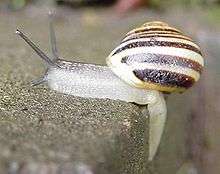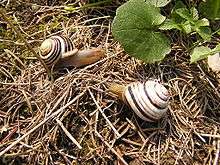Cepaea
Cepaea is a genus of medium-sized air-breathing land snails, terrestrial pulmonate gastropod mollusks in the family Helicidae. The shells of species within this genus are often brightly colored and patterned with stripes.[2] The two species from this genus, the common and widespread C. nemoralis and C. hortensis, have been model species for early studies of genetics and natural selection.[3] They occur in Europe, although introduced populations occur elsewhere in the world.[4]
- For the plant genus, see its synonym Sedum.
| Cepaea | |
|---|---|
 | |
| White-lipped snail Cepaea hortensis | |
| Scientific classification | |
| Kingdom: | Animalia |
| Phylum: | Mollusca |
| Class: | Gastropoda |
| Subclass: | Heterobranchia |
| Superorder: | Eupulmonata |
| Order: | Stylommatophora |
| Infraorder: | Helicoidei |
| Superfamily: | Helicoidea |
| Family: | Helicidae |
| Genus: | Cepaea Held, 1838[1] |
| Type species | |
| Helix nemoralis Linnaeus, 1758 | |
| Synonyms | |
| |
Like many Helicidae, this genus of snails create and use love darts.[2]
Species
For a long time, four species were classified in the genus Cepaea.

However, molecular phylogenetic studies suggested that the latter two should be placed in the unrelated genera Macularia and Caucasotachea:[5][6]
- Cepaea hortensis (O. F. Müller, 1774)
- Cepaea nemoralis (Linnaeus, 1758)
- Cepaea sylvatica (Draparnaud, 1801), now Macularia sylvatica
- Cepaea vindobonensis (Férussac, 1821), now Caucasotachea vindobonensis
References
- Held, F. (1838). "Notizen über die Weichthiere Bayerns. (Fortsetzung)". Isis (Leipzig). 1837 (12): 902–921.
- Robert Nordsieck. "Banded Snails (Cepaea Held 1838)". The Living World of Molluscs. Retrieved 19 August 2015.
- Jones JS, Heith BH, Ralwings P (1977). "Polymorphism in Cepaea: a problem with too many solutions?". Annual Review of Ecology and Systematics. 8: 109–143. doi:10.1146/annurev.es.08.110177.000545.
- "Genus summary for Cepaea". AnimalBase. 15 August 2014. Retrieved 19 August 2015.
- Neiber MT, Hausdorf B (2015). "Molecular phylogeny reveals the polyphyly of the snail genus Cepaea (Gastropoda: Helicidae)". Molecular Phylogenetics and Evolution. 93: 143–149. doi:10.1016/j.ympev.2015.07.022. PMID 26256642.
- Neiber MT, Sagorny C, Hausdorf B (2016). "Increasing the number of molecular markers resolves the phylogenetic relationship of 'Cepaea' vindobonensis (Pfeiffer 1828) with Caucasotachea Boettger 1909 (Gastropoda: Pulmonata: Helicidae)". Journal of Zoological Systematics and Evolutionary Research. 54 (1): 40–45. doi:10.1111/jzs.12116.
Further reading
- Yamazaki N.; Ueshima R.; Terrett J. A.; Yokobori S.; Kaifu M.; Segawa R.; Kobayashi T.; Numachi K.; Ueda T.; Nishikawa K.; Watanabe K.; Thomas R. H. (1997). "Evolution of pulmonate gastropod mitochondrial genomes: comparisons of complete gene organizations of Euhadra, Cepaea and Albinaria and implications of unusual tRNA secondary structures". Genetics. 145: 749–758.
| Wikimedia Commons has media related to Cepaea. |